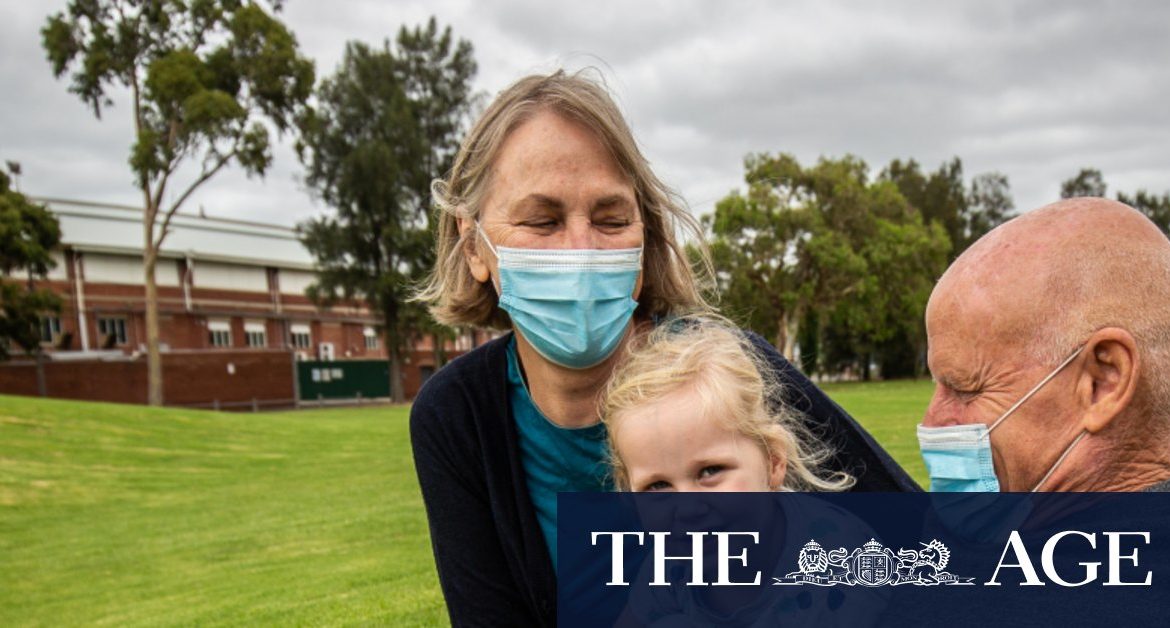But others were more sanguine, especially those with relatives and friends overseas. “I think we have a lot to be grateful for here,” says Zahra Dayoub, who shares a house with a British couple and an Irish flatmate.
She points to the UK, which on February 13 reported the daily number of people who tested positive to COVID-19 was 13,308 and the daily number of deaths within 28 days of a positive test was 621. “When you hear stories from the other side of the world it’s awful.”
Frustration was a common emotion expressed by those who congregated at Princes Park to jog, skate, play with small children (mercifully playgrounds are still open) or stroll with a friend clutching a takeaway coffee.
Although the Victorian government stressed last November it had unveiled a new stronger quarantine program to protect “everything we have built together”, some people expressed a sense of dismay the virus had once again escaped just as life was regaining a semblance of normality.
There was also doubt from some this would all be over by midnight on Wednesday, the official end to the five-day “snap” lockdown designed to deal with an outbreak of the infectious UK strain.
Michael Kirwan and Zahra DayoubCredit:Scott McNaughton
Ms Dayoub, 29, works in human resources and says she has been lucky to be able to work from home during the pandemic. She doesn’t want to catch the virus and says while she would almost certainly survive it, the long term effects are still little known. “When (Premier) Dan (Andrews) does his thing, it’s to protect us.”
But her house mate, Michael Kirwan, 29, who works in finance, is surprised the state has gone into lockdown with so few cases. “I think it’s going to set a dangerous precedent if everytime there are eight, ten, 11 cases, they put the whole state into lockdown,” he says.
He worries about the long-term impact of lockdowns on people’s mental health, on domestic violence and suicide and the economy. “It’s hard to be angry at the government but nobody knows what the trade-off of lockdowns is. In five years time will we say it was crazy locking down all the time?”
Angela Kraushaar was so stressed about Victoria’s snap lockdown she walked out of the house without her teeth in. At least, she says wryly, she is wearing a mask.

Angela Kraushaar with her dog, Bella.Credit:Scott McNaughton
Part of her wanted to stay indoors for five days and nights: “I find it confronting seeing everyone outside wearing masks and the whole fear thing,” says Ms Kraushaar, a nurse with more than 20 years of experience in aged care, disability, mental health and drug and alcohol services.
“It’s hard living in a world where there’s so much fear.”
But Ms Kraushaar’s dog, Bella, needed walking, so she headed for the park, taking a journal with her to make sense of her thoughts.
She too is a critic of the hotel quarantine program: “They should bloody well get quarantine hotels out of the city so it doesn’t impact on people so much,” Ms Kraushaar, 62, says.
There is no single view, but everyone has a view.
Dr Cyrus Westerland was in the park with his jauntily-attired greyhound Lana to meet his friend Matt Hogan. He had not previously been keeping a close eye on the number of cases – “it’s a bit too depressing” – but thought it was good the government reacted so quickly.

Dr Cyrus Westerland and Matt HoganCredit:Scott McNaughton
Dr Westerland, a psychiatry registrar, hopes it won’t go on for too long. “The second lockdown caused a lot of distress. People were becoming unwell who had never before experienced mental ill health.”
He says telehealth has been one silver lining. “It has been really good for people who can’t make it out of the house or lose a full day of work. It’s worked significantly better than I would have expected.”
Loading
Meanwhile, Ms Denman, before coming to Princes Park with her granddaughter, had been listening to Mary-Louise McLaws on the radio, a professor of epidemiology and adviser to the World Health Organisation, whom the pandemic has turned into a household name.
“She talked so sensibly questioning why it has taken so long to implement things that should have been really obvious a long time ago,” Ms Denman says.
Professor McLaws has long argued for the tightening up of quarantine, including daily rapid antigen testing of quarantine hotel staff and airport staff with close proximity to travellers.
Ms Denman’s partner, Mr Boynton, is a rower and he wonders if the 2021 Australian Henley Regatta – to be held on the Yarra River next weekend – will go ahead. But it’s the restaurateurs and florists, who were preparing for Valentines Day – that the couple feel really sorry for.
“It’s a huge day of the year for them that’s been blown out of the water without warning,” Ms Denman says.
Jewel Topsfield is social affairs editor at The Age. She has worked in Melbourne, Canberra and Jakarta as Indonesia correspondent. She has won multiple awards including a Walkley and the Lowy Institute Media Award.
Most Viewed in Politics
Loading







